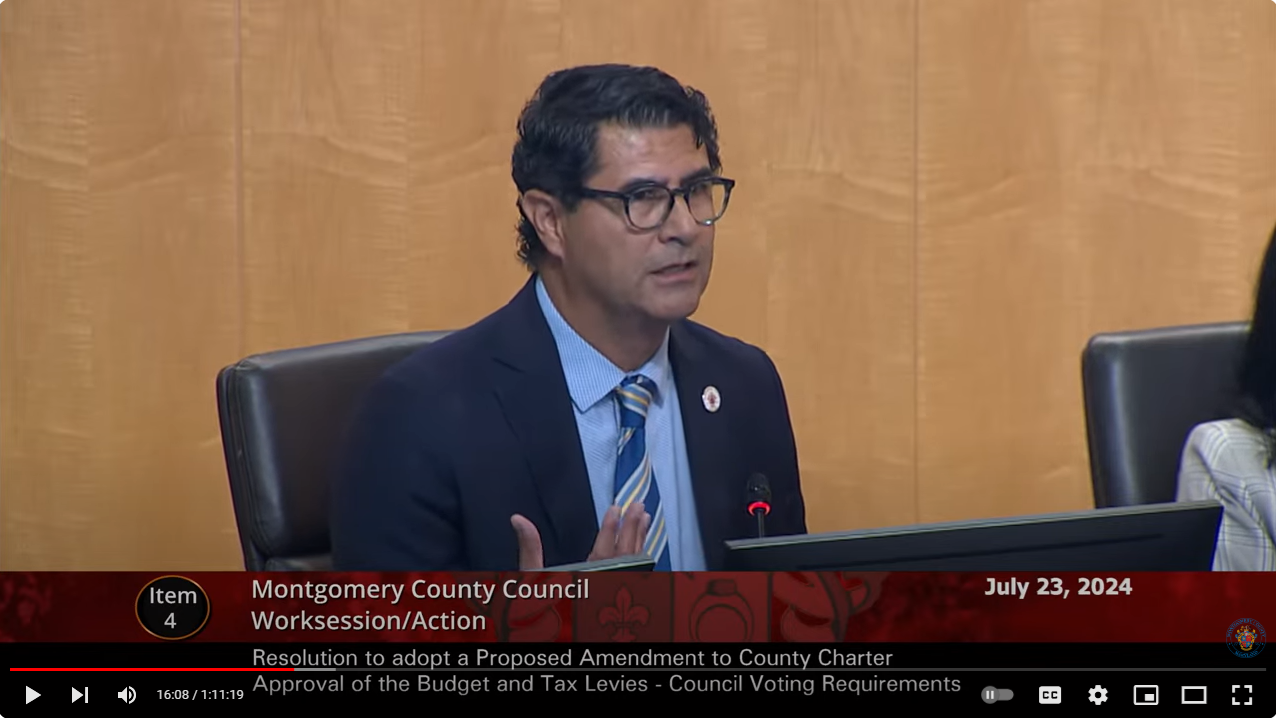By Adam Pagnucco.
Few county debates are more consequential than those concerning the charter, which is equivalent to the county’s constitution. And of such debates, the most weighty often pertain to taxes. The county council had a debate of that kind yesterday and it came down to one vote. This post summarizes the positions that were taken and the tally of votes cast.
First, I wrote about the charter amendment at hand last week. Part One recounted the history of charter amendments on property taxes and how we arrived at the current system we use. Part Two summarized my conflicting reactions to a recently introduced potential charter amendment changing the property tax limit override from a unanimous county council to a two-thirds vote, or effectively eight of eleven members. Specifically, I disliked unanimous requirements for anything (including tax policy), brought up the 2020 ballot questions as an example of how voters had approved a unanimous limit and mentioned the loophole in state law that effectively eviscerates local tax limits.
As it turns out, all of those points were brought up by different members of the council.
Charter amendments can be placed on the ballot in two ways: voters can place them directly with a minimum threshold of 10,000 valid signatures or the council can vote to place them by itself. In either case, any ballot question must be approved by a majority of general election voters to pass. In the past – 2020, for example – voters have had to decide between competing charter amendments making it to the ballot in these different ways.
The county has a charter review commission that recommends charter amendments to the council, which decides whether to put them on the ballot. (The council can also do it without their recommendation.) This year, the commission recommended a change in the charter limit on property tax increases. The current limit requires a unanimous vote of the council to raise the property tax rate. The commission proposed changing that to a two-thirds vote. Council Members Sidney Katz, Gabe Albornoz and Will Jawando introduced a charter amendment containing that recommendation that the council considered yesterday.
Albornoz made a case for the relaxation of the limit mirroring my dislike of unanimity. Here is an extract from what he said.

Council Member Gabe Albornoz.
*****
It is the recipe for chaos to leave open the possibility that just one member of this body can hold up an entire year’s fiscal operating budget. We had a situation in this last operating budget in which two of our colleagues abstained from voting on the MCPS version of the overall budget, and I respect their decision. And I respect their ability to make that decision. And then they both ultimately voted for the budget as a whole. But what would happen if in the eleventh hour when we convene as a body to vote on a budget and one of our colleagues decides to hold up the entire process? It would render the entire body and the entire county into chaos.
We are fortunate that this has not yet been enacted and we have all been very cordial and have established a tremendously strong working relationship with each other. We disagree on issues as we should but I have tremendous respect for all of you and I know all of you have respect for the body. But we can’t promise our public that that sense of cooperation and partnership will align moving forward. And so this is not about the ability to raise taxes for me. This is about the ability to prevent wreaking havoc on our overall system. That’s why I am – I feel strongly about this and why I support it – because it is not a hypothetical that I ever want any future council to have to even consider or deal with.
*****
A historical aside. A scenario akin to what Albornoz is describing actually occurred in 2008. In that year, County Executive Ike Leggett’s operating budget broke the charter limit on property taxes, which then required seven of nine votes to override. One council seat was vacant due to the passing of Marilyn Praisner and two members – Phil Andrews and Duchy Trachtenberg – opposed the tax hike and proposed a smaller one. On the day of the budget vote, two other council members – Roger Berliner and Marc Elrich – joined them for different reasons and the vote split 4-4. On the next day, the council unanimously passed a compromise negotiated by President Mike Knapp so chaos was averted. This occurred before a later change to state law enabling the bypass of local tax limits (which I will discuss below), so if the council had not compromised, this could have been a real problem.
Albornoz’s criticism of unanimity was echoed by many council members including Sidney Katz, Evan Glass, Kate Stewart, Dawn Luedtke, Will Jawando and Kristin Mink. However, Katz, Glass, Luedtke and Stewart brought up another point that I made: a change to state law in 2012 allows counties with charter limits to bypass them to fund education. (I explained this in a post titled The Hand of the King.) Montgomery County used this loophole to pass a property tax hike last year even though four council members voted no and since money is fungible, lots of departments got big increases. So the county council itself has proven that the unanimous charter limit is ineffective. What’s more, Luedtke and Council Member Marilyn Balcombe brought up the fact that county voters approved the unanimous limit. They actually did so on three different occasions: 2008, 2018 and 2020.
Here is Balcombe’s case against the proposed charter amendment.

Council Member Marilyn Balcombe.
*****
So as council president started the discussion, we’re not here today to judge the merits of the amendment but whether they should go on the ballot. The entire reason we have a unanimous vote requirement is because Montgomery County voters voted for that requirement. And we should not make it easier to raise taxes. Raising taxes should be very hard and should only be done in rare circumstances. Having an extremely high requirement puts pressure on the county executive and the county council to be frugal with taxpayer dollars and it forces us to really look at every dollar that we spend.
I agree with the argument that we should not let one rogue individual stand in the way of providing our community with necessary resources. But we have the ability to override this requirement to fund our education, which is half of our budget and we just did that so – when we raised taxes to fund our school system in the 2024 budget – so I will not be voting for this amendment.
*****
One statement by Jawando requires comment. In his remarks agreeing with Albornoz, Jawando characterized the unanimous override limit as a “Republican-led amendment to cripple the body.” It’s true that the original unanimous requirement came from a 2008 ballot question authored by Republican tax activist and perennial candidate Robin Ficker, who gathered the signatures to place it on the ballot. However, it was the county council itself that placed charter amendments on the ballot which also contained unanimous overrides in 2018 and 2020. Jawando voted in favor of the latter amendment. And of course, the voters – all voters, not just Republicans – passed all three of them.
When discussion ended, the council voted on whether to place this charter amendment on the ballot. Here is the tally.
Albornoz moved the measure.
Council Member Laurie-Anne Sayles seconded it.
Voting Yes – Jawando, Albornoz, Stewart, Sayles and Mink.
Voting No – Katz, Natali Fani-Gonzalez, Balcombe, Friedson, Glass and Luedtke.
The measure failed and will not appear on the 2024 general election ballot.
So why in the end did this measure fail? This was not a predestined event. Some of my sources were predicting that it would pass the day before the vote. But a lot of discussion preceded the vote with much of it containing the arguments laid out above. My hunch is that it would have passed except that state law already permits the council to break the charter limit, as many council members noted. So what is gained by a controversial attempt to acquire authority they already have? As former Council Member Roger Berliner used to say, “The juice is not worth the squeeze.”
There are two effects of this vote.
First, the council deftly sidestepped a headache it did not need. If it had passed this measure, the headlines would have said, “Council wants to make tax hikes easier” and that story would have made the rounds for months. Now, a fight over taxes is postponed until next year’s operating budget. (And I would not be surprised if there is one.)
Second, if the council had put this on the ballot, there were whispers that some elements of the business community would fund an effort to fight it. That won’t happen now, so those same entities can focus on another priority:
Funding a push for term limits to kick out County Executive Marc Elrich.







